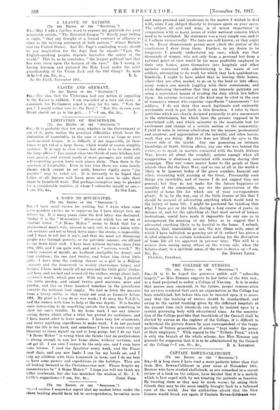Its THE EDITOR or THIt " SPECTATOR.") Ste,—I confess I
somewhat regret that my modest letter under the above heading-should have led to correspondence, becoming more and more personal and irrelevant to the matter I wished to deal with, since I am obliged thereby to trespass again on your space. The subject, all said and done, is of minor importance' in comparison with so many issues of wider national concern which need to be ventilated. My statement was a very simple one, and to it I adhere unreservedly. The facts are well known; or they ought to be. Every dispassionate person must admit the justice of the conclusions I drew from them. Further, in my desire to be temperate I greatly understated my case; which was- that thousands of women, who not only from a personal but from a national point of view would be far more profitably employed in their own homes, press themselves into hospitals and other agencies concerned with administering to the wants of our soldiers, attempting to do work for which they lack qualifioation. Similarly, I might to have added that in leaving their homes, where they are often needed, to go on to the land or into offices, many women are merely juggling with their consciences; and while flattering themselves that they are intensely patriotic are using a convenient means of evading the. duty which lies before them. An extreme instance of the kind may be cited in the ease of numerous women who organize superfluous "amusements" for soldiers. I do not deny that much legitimate and eminently serviceable work is put forth in this direction. I refer to those activities which are clearly designed primarily to give amusement to the entertainers, but which leave the persons suppoeed to be entertained cold, and which minister to the insatiable lust for excitement and change of a certain section of the community. I yield to none in intense admiration for the nurses, professional and amateur, and appreciation of the splendid, and often heroic, . work they are doing. But this does not blind the eyes to the reverse side of the shield. Any one possessing an intimate knowledge of South African affairs, any one who was behind the scenes, so to speak, in matters connected with the South African War, knows all about the scandals, serious enough when all exaggeration is dismissed, associated with nursing during that campaign. This war comes nearer home to the people of these islands than did the Beer War, and no one at all in the world ii likely to be ignorant today of the grave Evendale, financial and other, co-existing with nursing at the front. Presumably such things are inevitable, and of course I do not suggest they are general; but they do not make for the future happiness or morality of the community, nor for the preservation of the sanctity of home life for which one of your correspondents pleads. It is, by the way, one of the little ironies of life that I should be accused of advocating anything which would tend to the injury of home life. I might be pardoned for thinking that what I have put on the table, during a long course of years, in defence of, and for the upholding of, that most sacred of human institutions, would have made it impossible for any one so to misrepresent the meaning of my letter as to suggest that I advocated anything likely to be hurtful to the home. I submit, however, that, unavoidable or not, the war (those evils, some of which I have indicated, as growing out of it, rather) has given a decided stimulus to certain tendencies making for the disruption of home life all too apparent in pre-war days. This will be a serious item among many others on the wrong side, when the balance-skeet, in a spiritual sense, of the war is drawn up.—I am,.






































 Previous page
Previous page